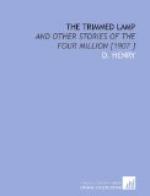Blinker interrupted him with a loud, discordant laugh.
“Brickdust Row for an even hundred,” he cried. “And I own it. Have I guessed right?”
“The tenants have some such name for it,” said Lawyer Oldport.
Blinker arose and jammed his hat down to his eyes.
“Do what you please with it,” he said harshly. “Remodel it, burn it, raze it to the ground. But, man, it’s too late I tell you. It’s too late. It’s too late. It’s too late.”
THE MAKING OF A NEW YORKER
Besides many other things, Raggles was a poet. He was called a tramp; but that was only an elliptical way of saying that he was a philosopher, an artist, a traveller, a naturalist and a discoverer. But most of all he was a poet. In all his life he never wrote a line of verse; he lived his poetry. His Odyssey would have been a Limerick, had it been written. But, to linger with the primary proposition, Raggles was a poet.
Raggles’s specialty, had he been driven to ink and paper, would have been sonnets to the cities. He studied cities as women study their reflections in mirrors; as children study the glue and sawdust of a dislocated doll; as the men who write about wild animals study the cages in the zoo. A city to Raggles was not merely a pile of bricks and mortar, peopled by a certain number of inhabitants; it was a thing with a soul characteristic and distinct; an individual conglomeration of life, with its own peculiar essence, flavor and feeling. Two thousand miles to the north and south, east and west, Raggles wandered in poetic fervor, taking the cities to his breast. He footed it on dusty roads, or sped magnificently in freight cars, counting time as of no account. And when he had found the heart of a city and listened to its secret confession, he strayed on, restless, to another. Fickle Raggles!—but perhaps he had not met the civic corporation that could engage and hold his critical fancy.
Through the ancient poets we have learned that the cities are feminine. So they were to poet Raggles; and his mind carried a concrete and clear conception of the figure that symbolized and typified each one that he had wooed.
Chicago seemed to swoop down upon him with a breezy suggestion of Mrs. Partington, plumes and patchouli, and to disturb his rest with a soaring and beautiful song of future promise. But Raggles would awake to a sense of shivering cold and a haunting impression of ideals lost in a depressing aura of potato salad and fish.
Thus Chicago affected him. Perhaps there is a vagueness and inaccuracy in the description; but that is Raggles’s fault. He should have recorded his sensations in magazine poems.
Pittsburg impressed him as the play of “Othello” performed in the Russian language in a railroad station by Dockstader’s minstrels. A royal and generous lady this Pittsburg, though—homely, hearty, with flushed face, washing the dishes in a silk dress and white kid slippers, and bidding Raggles sit before the roaring fireplace and drink champagne with his pigs’ feet and fried potatoes.




